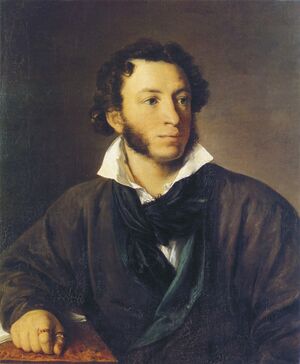Aleksandr Pushkin
Leading Russian author and poet of the romantic era (b. 26 May/6 June 1799 in Moscow; d. 29 January/10 February 1837 in Saint Petersburg), born Aleksandr Sergeyevich Pushkin (Александр Сергеевич Пушкин), also known in English as Alexander Pushkin.
Tchaikovsky's Settings of Works by Pushkin
Completed
Pushkin's works formed the basis for three out of Tchaikovsky's eleven operas:
- Yevgeny Onegin (Евгений Онегин), Op. 24 (1877-78), also known as Eugene Onegin, after Pushkin's novel in verse of the same name (1837).
- Mazepa (Мазепа) (1881-83), after Pushkin's historical poem Poltava (Полтава) (1829).
- The Queen of Spades (Пиковая дама), Op. 68 (1890), after Pushkin's short story of the same name (1834).
Two of Tchaikovsky's songs are also set to Pushkin's poems:
- Zemfira's Song (Песнь Земфиры), probably dating from the 1860s, uses two stanzas from Pushkin's 1824 poem The Gypsies (Цыганы).
- The Nightingale (Соловей), No. 4 of the Twelve Romances, Op. 60, after Pushkin's Russian translation of the Serbian folksong Three Greatest Sorrows (Tri naveće tuge) (1834).
Why Did the Merry Voice Grow Silent? (Что смолкнул веселия глас?), the second of Tchaikovsky's Three Choruses (1891), is based on Pushkin's poem Bacchic Song (Бакхическая песня) (1825).
At some point during his student years (1863-65), Tchaikovsky wrote music to accompany the Fountain Scene in Pushkin's tragedy Boris Godunov (Борис Годунов) (1825), although this composition is now lost.
Tchaikovsky's symphonic ballad The Voyevoda, Op. 78 (1890-91) was inspired by Pushkin's translation of the poem Czaty: Ballada ukraińska (The Ambush: A Ukrainian Ballad) by Adam Mickiewicz (1798-1855).
Unrealised
In December 1884 and January 1885, Tchaikovsky corresponded with Vasily Kandaurov about a projected opera called The Gypsies (Цыгане), after Pushkin's 1824 poem of the same name. Although Kandaurov had already begun work on the libretto, Tchaikovsky quickly decided not to pursue the project.
Between 1885 and 1888 Tchaikovsky considered writing an opera on the subject of Pushkin's 1836 novel The Captain's Daughter (Капитанская дочка), to a libretto by Ippolit Shpazhinsky, before rejecting the idea.
A short sketch to words from Pushkin's poem The Vampire (Вурдалак) in the collection Song of the Western Slavs (Песни западных славян) (1834) — itself a translation from the French of La Guzla (1827) by Prosper Mérimée (1803–1870) — were made with those for Nos. 12 and 13 of the Sixteen Songs for Children, Op. 54 (1881-83), but this was not subsequently developed.
Bibliography
- Eugen Onegin. Text nach Puschkin, musik von Tschaikowsky (1892)
- Музыкальные наброски. Пушкин в музыке (1899)
- Пушкин и Чайковский (1912)
- Пушкин в претворений Глинки и Чайковского (1922)
- Пушкинская комната в Доме-музее П. И. Чайковского в Клину (1924)
- Чайковский и Пушкин (1930)
- Пушкин и Чайковский (1935)
- Пушкин и русская опера (1937)
- Пушкин и русская опера (1937)
- Пушкин в библиотеке П. Чайковского (1937)
- Мазепа. Опера. Музыка П. И. Чайковского, по поеме А. С. Пушкина Полтава (1937)
- Чайковский и Пушкин (1940)
- Чайковский и Пушкин (1940)
- Пушкин и Чайковский (1949)
- Пушкин и Чайковский (1950)
- До Онегина (1950)
- Пушкин и Чайковский (1957)
- Пушкин и Чайковский (1964)
- Pushkin and the opera in Russia (1971)
- Под небом Каменки (1972)
- Каменский литературно-мемориальный музей А. С. Пушкина и П. И. Чайковского. Путеводитель (1972)
- Poesjkien's Jevgeny Onjegin prentenboek (1974)
- К вопросу о психологий женского образа в пушкинских операх П. И. Чайковского (1980)
- Tchaikovsky, Pushkin and Onegin (1980)
- Память Каменки любя? (1980)
- Когда погас фейерверк (1983)
- Музей О. С. Пушкиiна та П. И. Чайковськогу у Камьиянцi = Музей А. С. Пушкина и П. И. Чайковского в Каменке. Фотоальбом (1986)
- The Music in Pushkin (1987)
- Каменский литературно-мемориальный музей А. С. Пушкина и П. И. Чайковского. Путеводитель (1987)
- Чайковский в Музее имени Пушкина (1987)
- Une mise en scène qui éclaire Pouchkine (1989)
- Избирательное сродство. Чайковский о Пушкине (1990)
- Единый лавр их дружно обвивает. [1] (1990)
- Отзвуки русского сентиментализма в Пушкинских операх Чайковского (1995)
- Mädchen singen von Liebe. Anmerkungen zu einem festen Szenen-Typus in Čajkovskijs Puškin-Opern (1997)
- Romantic literary narrative into opera. Towards a poetics of transposition (1997)
- Tchaikovsky and Pushkin. Men of Russian Letters (1998)
- Frauenschicksale in Čajkovskijs Puskin Opern. Aspekte eine Werke-Einheit (2002)
- Евгений Онегин А. С. Пушкина и П. И. Чайковского. Текст и версии (2012)

